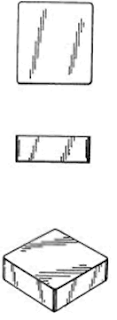Wednesday whimsies
 On the tiles. News has reached the IPKat's ears that that mighty and multitudinously litigious Mattel, owners of the SCRABBLE trade mark, have had a dramatic reverse with regard to its three-dimensional Scrabble tile UK trade mark registration. This occurred earlier today in the Chancery Division, England and Wales, where Mr Justice Arnold gave his ruling in JW Spear & Sons Ltd & Another v Zynga, Inc [2012] EWHC 3345 (Ch). Mattel maintained that Zynga infringed four of its trade marks, of which the Scrabble tile (right) was one. The verbal description of the mark states:
On the tiles. News has reached the IPKat's ears that that mighty and multitudinously litigious Mattel, owners of the SCRABBLE trade mark, have had a dramatic reverse with regard to its three-dimensional Scrabble tile UK trade mark registration. This occurred earlier today in the Chancery Division, England and Wales, where Mr Justice Arnold gave his ruling in JW Spear & Sons Ltd & Another v Zynga, Inc [2012] EWHC 3345 (Ch). Mattel maintained that Zynga infringed four of its trade marks, of which the Scrabble tile (right) was one. The verbal description of the mark states:"The mark consists of a three dimensional ivory-coloured tile on the top surface of which is shown a letter of the Roman alphabet and a number in the range of 1 to 10".Zynga counterclaimed for the invalidity of the tile mark on the basis that it did not comply with the basic criteria of registrability under Article 2 of the Trade Mark Directive. Zynga daringly opted to apply for summary judgment in this part of their counterclaim -- and got it. In a judgment of only 50 paragraphs, the learned judge quite demolished the mark, concluding:
"...the Tile Mark covers an infinite number of permutations of different sizes, positions and combinations of letter and number on a tile. Furthermore, it does not specify the size of the tile. Nor is the colour precisely specified. In short, it covers a multitude of different appearances of tile. It thus amounts to an attempt to claim a perpetual monopoly on all conceivable ivory-coloured tile shapes which bear any letter and number combination on the top surface. In my view that is a mere property of the goods and not a sign. To uphold the registration would allow Mattel to obtain an unfair competitive advantage".This Kat has not yet had time to peruse the judgment closely; he or one of the other Kats may yet return to it -- but he just about has has time to send a katpat to his friend Paul Stevens at Olswang LLP (who appeared for Zynga) for alerting him to this decision.
 |
| A vote for IP Draughts is a vote for Mr Pettifog ... |
 |
| But the Rottweiler sometimes lets go ... |
(i) how embracing the internet can help the creative sector to flourish;You can find her speech in full here, thanks to the IPKat's friend Magali Delhaye. Merpel wonders whether "the creative sector" means, as she hopes it does, "people who create work which is blessed with copyright protection so that they can feel confident in developing and commercialising it", rather than "people who would be really good at creating profits if it wasn't for everybody else's copyright getting in the way"
(ii) how we are supporti.ng media freedom and pluralism in and outside the EU;
(iii) Third, how we need strong digital infrastructure and frameworks for all of this to happen.
